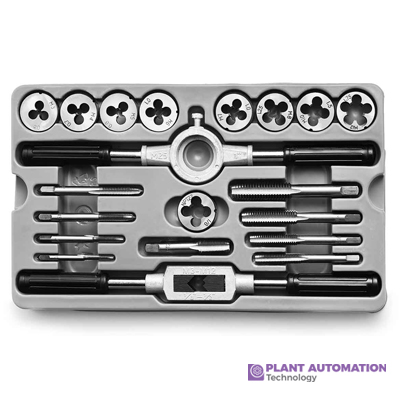Precision Crafting: Exploring Special Dies & Tools & Die Sets in Industrial Manufacturing

Introduction:
In the realm of industrial manufacturing, precision is not just a goal but a necessity. Special dies, tools, and die sets play a crucial role in achieving this precision, impacting the quality, efficiency, and versatility of manufacturing processes across various industries. This article delves into the world of precision crafting, exploring the significance, applications, innovations, challenges, and future trends of special dies, tools, and die sets in industrial manufacturing.
Understanding Special Dies, Tools, and Die Sets:
Special dies, tools, and die sets are precision-engineered components used in manufacturing processes such as cutting, forming, stamping, molding, and extruding. They are designed to shape raw materials into specific shapes and dimensions with high accuracy and repeatability. These components are typically made from hardened steel, carbide, or other durable materials to withstand the rigors of industrial production environments.
Applications in Industrial Manufacturing:
The applications of special dies, tools, and die sets are diverse and span across multiple industries. In metalworking, they are used for blanking, piercing, bending, and forming metal sheets and components. In plastic molding, they facilitate the creation of intricate plastic parts with tight tolerances. In woodworking, specialized dies and tools enable precise cutting, shaping, and joinery. Additionally, these components find applications in industries such as automotive, aerospace, electronics, medical devices, and consumer goods manufacturing.
Innovations Driving Precision Crafting:
Advancements in materials science, machining technologies, and digitalization have led to significant innovations in special dies, tools, and die sets. High-speed machining techniques, such as CNC milling and EDM (Electrical Discharge Machining), allow for complex geometries and fine surface finishes. Additive manufacturing techniques, such as 3D printing, offer new possibilities in rapid prototyping and customized tooling. Digital tools like CAD/CAM software enhance design accuracy and simulation capabilities, optimizing tool performance and reducing lead times.
Challenges and Solutions:
Despite the advancements, challenges persist in the realm of precision crafting. Maintaining tool longevity and performance in high-volume production, managing thermal expansion and contraction effects, and addressing material compatibility issues are ongoing concerns. However, industry experts are developing solutions such as advanced coatings for tool durability, thermal management systems for temperature control, and material selection strategies for optimal performance under varying conditions.
Future Trends and Outlook:
Looking ahead, the future of precision crafting with special dies, tools, and die sets is promising. Integration with Industry 4.0 technologies, such as IoT (Internet of Things) sensors and AI (Artificial Intelligence) algorithms, will enable real-time monitoring, predictive maintenance, and adaptive machining strategies. Customization and on-demand manufacturing will continue to drive innovation, with agile production setups capable of rapid tooling changes and small-batch production runs. Collaboration between manufacturers, tooling suppliers, and research institutions will further accelerate advancements in precision crafting, paving the way for enhanced productivity, quality, and sustainability in industrial manufacturing.
Impact on Industrial Efficiency and Quality:
The use of special dies, tools, and die sets has a direct impact on industrial efficiency and product quality. By ensuring precise shaping and forming of materials, these components contribute to the consistency and accuracy of manufactured parts. This, in turn, reduces scrap rates, rework, and production downtime, leading to improved overall efficiency and cost-effectiveness. Moreover, the ability to achieve tight tolerances and intricate designs enhances the quality and functionality of end products, meeting or exceeding customer expectations.
Case Studies and Examples:
To illustrate the practical applications and benefits of special dies, tools, and die sets, let's consider a few case studies:
Automotive Industry: Special dies and tools are used in the automotive industry for stamping metal parts such as body panels, chassis components, and engine parts. Precision dies ensure uniformity in part dimensions, while specialized tools enable complex forming processes such as deep drawing and extrusion. This results in high-quality automotive components with excellent fit and finish.
Medical Devices Manufacturing: In the medical devices sector, precision is paramount to ensure the safety and efficacy of products. Specialized die sets are employed in the production of surgical instruments, implants, and device components. Tight tolerances and smooth surface finishes are achieved through advanced machining techniques, guaranteeing precise functionality and patient safety.
Electronics and Semiconductor Industry: Special dies and tools play a crucial role in the fabrication of electronic components and semiconductor devices. Microscopic features and intricate patterns are etched, cut, or molded using precision tooling, enabling the miniaturization and performance enhancement of electronic products.
These case studies demonstrate how special dies, tools, and die sets contribute to the success of diverse industries by enabling efficient production processes, high-quality output, and technological advancements.
Conclusion:
Precision crafting with special dies, tools, and die sets is integral to the modern landscape of industrial manufacturing. The synergy between technological innovations, skilled craftsmanship, and industry expertise drives continuous improvement in tooling capabilities. As industries evolve and demand for customized, high-performance products grows, the role of precision tooling becomes increasingly indispensable. By embracing advancements in materials, machining, and digitalization, manufacturers can unlock new levels of efficiency, quality, and competitiveness. The journey of precision crafting is a testament to human ingenuity and the relentless pursuit of excellence in manufacturing.






